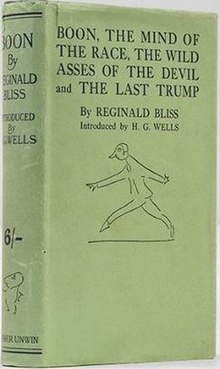Boon (novel)

First edition
|
|
| Author | H. G. Wells |
|---|---|
| Original title | Boon, The Mind of the Race, the Wild Asses of the Devil, and The Last Trump: Being a First Selection from the Literary Remains of George Boon, Appropriate to the Times, Prepared for Publication by Reginald Bliss, with an Ambiguous Introduction by H.G. Wells |
| Country | United Kingdom |
| Language | English |
| Subject | Satire |
| Publisher | T. Fisher Unwin |
|
Publication date
|
1915 |
| Pages | 345 |
| Preceded by | The War That Will End War |
| Followed by | Bealby |
Boon is a 1915 work of literary satire by H. G. Wells. It purports, however, to be by the fictional character Reginald Bliss, and for some time after publication Wells denied authorship. Boon is best known for its part in Wells's debate on the nature of literature with Henry James, who is caricatured in the book. But in Boon Wells also mocks himself, calling into question and ridiculing a notion he held dear—that of humanity's collective consciousness.
Boon opens with an introduction by Wells, calling it "an indiscreet, ill-advised book." Wells pretends to repudiate any public identification with the work: "Bliss is Bliss and Wells is Wells. And Bliss can write all sorts of things that Wells could not do."
As he was to do in The Research Magnificent, Wells creates a literary character (Reginald Bliss) who is making a book out of the literary remains of an author who has recently died (George Boon, a popular author of books and plays). Bliss attributes Boon's death to depression on account of the war. Bliss expresses disappointment that among Boon's papers (kept in "barrels in the attic") he has found "nothing but fragments" and "a curious abundance of queer little drawings," many of which are reproduced'.
The principal text by Boon that he presents is titled The Mind of the Race, which is "the singularly vivid and detailed and happily quite imaginary account of the murder of that eminent littérateur, Dr. Tomlinson Keyhole." Bliss also recounts conversations about the themes of this work which he has had with Boon and with Edwin Dodd, "a leading member of the Rationalist Press Association, a militant agnostic," and later with an author named Wilkins.
The principal philosophical theme engaged in Boon is whether such a thing as "the Mind of Humanity" can be said to exist, or whether, as Dodd believes, such a notion is "mysticism."
In the unfinished work Boon was planning, a character named Hallery is "fanatically obsessed by this idea of the Mind of the Race," as indeed Wells was himself. He is imagined lecturing unsuccessfully on the subject at a conference on the subject at a seaside villa that Henry James attends. Chapter 4 of Boon is largely a frontal assault on Henry James's late manner, and contains long pastiches of his style. James's belief that a novel should have unity is vigorously attacked, as are his characters ("eviscerated people he has invented" who "never make lusty love, never go to angry war, never shout at an election or perspire at poker," but only "nose out suspicions, hint by hint, link by link"). Chapter 5 mocks other writers, especially George Bernard Shaw, and includes an outline of a paper on "The Natural History of Greatness, with especial reference to Literary Reputations" that shows that some of Wells's critical notions were far ahead of his time. Wells's stand-in Hallery argues for an expansion of the concept of literature that anticipates future critical developments. Chapter 6 analyses the resistance Hallery's quasi-religious concept of the institution of literature inspires, even in Hallery himself. Chapter 7 criticises the thought of Friedrich Nietzsche and lambastes Houston Stewart Chamberlain's pro-German work The Foundations of the Nineteenth Century.
...
Wikipedia
